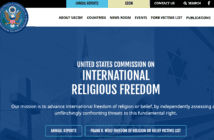A new analysis by Brian J. Grim of the Religious Freedom and Business Foundation finds that violent incidents between religious groups are more prevalent in areas where governments restrict religious proselytization.
According to Grim’s article in The Weekly Number, hostilities over proselytization are five times more likely in countries with laws restricting such activity. Grim says that conversely, restrictive laws are excused by saying they will reduce religious hostilities.
 Grim offers three possible answers to the question of why proselytising might be associated with lower religious hostilities:
Grim offers three possible answers to the question of why proselytising might be associated with lower religious hostilities:
- Religious hostilities tend to be highest when governments restrict religious freedom. Grim states that by contrast, when religious freedom is protected and people are free to persuade others of their beliefs, societies have a “rich pluralism that gives space for moderate voices within religions”.
- Proselytism promotes moderation as it puts religious activity out in the open. Grim argues that it is important that people at risk of extremist radicalisation are engaged by people other faiths, with other points of view. “To the extent that violent extremism feeds on the lack of informed religious understanding, proselytizing is one mechanism through which diverse and arguably less violent forms of religion can be explored.” Grim does not suggest that proselytism is a measure to handle violence – rather that people who are being enticed into a violent future need to be persuaded to take a more moderate path and should be presented with other viewpoints.
- Research by political scientist Robert Woodberry demonstrated statistically that proselytising Protestants heavily influenced the rise and spread of stable democracy around the world. His recent article in the American Political Science Review says such missions were “a crucial catalyst initiating the development and spread of religious liberty, mass education, mass printing, newspapers, voluntary organisations, and colonial reforms, thereby creating the conditions that made stable democracy more likely.”
See Brian Grim’s article in full here.



